Cullom Cahill
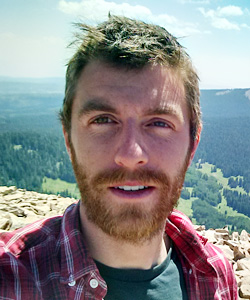 A Religious Studies degree is extremely valuable when looking to pursue any career in which you work with a diverse group of individuals, or individuals who do not share your same cultural background.
A Religious Studies degree is extremely valuable when looking to pursue any career in which you work with a diverse group of individuals, or individuals who do not share your same cultural background.
Since graduating, I have been fortunate enough to work with people from a wide range of backgrounds: I spent 4 years working with families struggling with homelessness in Milwaukee, several years mentoring at risk youth, and currently, I work with children of wealthy families struggling with a wide array of issues as a wilderness therapy counselor. Throughout my experiences since college, I have drawn heavily on my religious studies background. Being aware of the ways someone’s cultural/religious background influences their daily actions and beliefs has given me the ability to provide more empathetic, culturally sensitive, and thus more effective care in all positions I have held.
Given the current state of our country, Religious Studies courses and degrees are becoming invaluable to our society. I believe knowledge from this field is necessary to help move our society past our current struggles with intolerance, and towards not just tolerance but acceptance of all humans.
Majors: History, Sociology and Religious Studies.
Alora Rodriguez
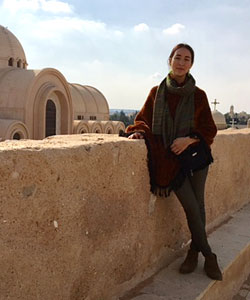 The Religious Studies Program at UWM taught me a great deal about the diversity of people.
The Religious Studies Program at UWM taught me a great deal about the diversity of people.
Religious Studies provided me with a knowledge of various religions, cultures, and beliefs. This knowledge affords me the ability to understand and interact with people in a meaningful way.
This ability along with my commitment to serve communities in need prepared me for work in the nonprofit field. I have spent two years working for the Girl Scouts in the Urban Initiative Department and have just accepted a position at Lake Valley Camp as Manager of their Urban Program. Both organizations provide direct services to Milwaukee’s diverse and underserved populations.
Don McLeod
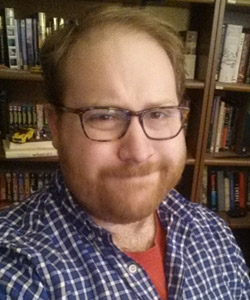 I studied History and Religious Studies as an undergraduate, and Library Science as a graduate student.
I studied History and Religious Studies as an undergraduate, and Library Science as a graduate student.
I think that Religious Studies is important to me because it helped me understand the values of other people, both within my culture and others. So much of our current value systems are either based on or a reaction to the prevailing religious beliefs and it can be good to examine what those beliefs are and how they’ve changed or stayed the same over the years and how they relate to other religions.
Religious Studies has influenced me creatively. I like to write, I have several projects on-going, and most of them are based off of ideas I came up with thanks to my Religious Studies education. One project is a fantasy story centered on a group of people of different religions – Christian, Jewish, Buddhist, atheist, polytheist, animist, etc. – and how their religion influences them as people and how they interact with the world and each other. It’s something I’m trying to do as kind of a reaction to the heavily Christian influence in fantasy you see from heavyweights of the genre like Tolkien. Another project is about what would happen if a god in the manner of a Greek or Norse deity were to appear on modern earth and would seek to be worshipped again, to explore how somebody with an ancient world-view would relate to modern society and its power structures.
Gregory Joshua Zimmerman
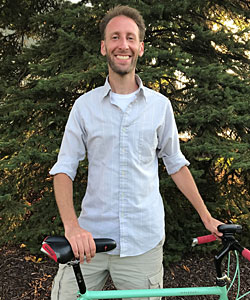 Majors in History, Religious Studies, Philosophy; Minors in Greek and Latin
Majors in History, Religious Studies, Philosophy; Minors in Greek and Latin
Religious Studies should be considered essential not only for anyone who wishes to understand the human condition, but also for anyone who wishes to serve or help others.
The Religious Studies Program tied together and integrated many of my disparate academic interests. Throughout history, religion has served as major motivator in the pursuit of knowledge and the development of culture. Unfortunately, modern western societies often downplay the influence of religion in the public sphere. As a result, many people are left ignorant of not only their own world, but also the culture and background of those whom they interact with on a daily basis. In a multicultural setting such as our own, a proper understanding of the world religions and their influence becomes all the more important.
Involvement with Religious Studies Department greatly enhanced my time at UWM and focused the direction I wanted to move in. After graduating, I entered St. Vincent Archabbey, a Benedictine monastery in Pennsylvania, and began living as a monk. While the life of a Benedictine monk is rooted specifically in the Catholic tradition, the work of monk, whether it be teaching or reaching out to those in need in the surrounding community, often brings me into contact with wide range of people from a variety of religious backgrounds.
Today, as I continue to pursue this religious vocation, my experience with the Religious Studies Program has proven to be indispensable. In short, if you wish to know, understand, or help other people, then Religious Studies is essential.
James Cimermancic
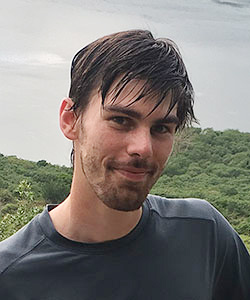 The value of Religious Studies is not so much in learning the nuances of religions, but in learning to see from the point of view of people who do not share your beliefs about the world.
The value of Religious Studies is not so much in learning the nuances of religions, but in learning to see from the point of view of people who do not share your beliefs about the world.
Living and teaching in Taiwan, I use the ways of thinking I learned in Religious Studies every day.
Religious Studies taught me how to extrapolate from a small amount of information less-than-obvious judgments and observations. Though I never studied about the people or the religions of Taiwan in university, I quickly learned how act appropriately. More importantly, I learned how to understand the mindset of the children and young adults I teach, even when they are unwilling or unable to express themselves. As an English as a Second Language teacher, it is especially important to be able to relate culturally to your students.
I see the difference Religious Studies has made when my students’ parents trust me (foreigners can have a less than stellar reputation here).
I see the difference when the Taiwanese invited me to live in an area no foreigners had lived before.
I see the difference when the personal connections I have made have gotten me better jobs.
I will not always be teaching English. This time next year, I expect to be going to law school back in the US, and so I am currently studying for the Law School Admission Test (LSAT). I would not describe the LSAT as easy by any means, but learning to critically and objectively analyze documents in Religious Studies has given me more than a head start on it. In my case, Religious Studies has not just provided me with the ability to more deeply and fully understand others, but the skills I learned will directly translate into going to a better law school.
Noelle Storms
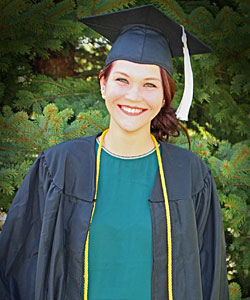 I graduated from UWM with a History major and a Religious Studies minor. Religious Studies is important to me because I want to be able to better understand people and connect with people more and I know that learning about their beliefs is the most essential part of that.
I graduated from UWM with a History major and a Religious Studies minor. Religious Studies is important to me because I want to be able to better understand people and connect with people more and I know that learning about their beliefs is the most essential part of that.
Right after graduation I worked with refugees from Burma. My Religious Studies background helped me recognize that I would need to know what religion each family practiced so that I could better help them. I was able to see their culture and help them mix it with the new culture they came into rather than try to replace it. My ultimate career goal is to work in a field that allows me to travel and help
people all over the world. With my Religious Studies background, I can confidently explore and be a part of cultures different than my own and know what is expected of me and at the same time respect the customs and beliefs of other people. Religious Studies helps me help other people because it has taught me to take a step back and appreciate what makes up that person. I am able to have a larger impact on someone’s life when I am able understand their point of view and help them to resolve problems within the framework of their culture and their religion.
Although I am not entirely certain where I will go from here, I am grateful for my training in Religious Studies at UWM.
Sam Dorios
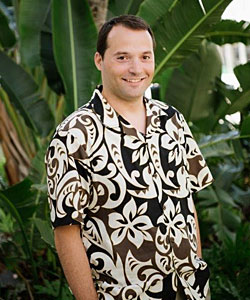 I double-majored in History and Religious Studies. My focus was especially on ancient history of the Mediterranean and Near-East, Early Christianity, Ancient Judaism, and Ancient Paganism.
I double-majored in History and Religious Studies. My focus was especially on ancient history of the Mediterranean and Near-East, Early Christianity, Ancient Judaism, and Ancient Paganism.
Religious Studies helped me to understand, empathize, and respect the perspectives and beliefs of others (even of those with which I firmly disagree), which has not only been critical for the success of my current career path, but also has helped me to become a better human being.
Currently I’m the Systems and Complexity Associate for the Hawaii Leadership Forum, a non-profit organization dedicated to fostering better leaders in Hawaii in order to create positive, sustainable social change. Part of my work involves bringing diverse groups together, understanding their perspectives and beliefs, and synthesizing their stories into a comprehensible, powerful, and true narrative which amply reflects the thoughts and feelings of everyone involved. Both the explicit and tacit lessons and skills I learned from the Religious Studies program is directly responsible for my success in these endeavors.
Taylor Layton
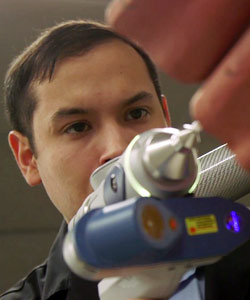 Earning a degree in Religious Studies fostered sincere cross-cultural understanding through exposure to dynamic perspectives and global dialogues which I have found to be indispensable.
Earning a degree in Religious Studies fostered sincere cross-cultural understanding through exposure to dynamic perspectives and global dialogues which I have found to be indispensable.
As a history major, religion consistently exists as a theme in many classes. Adding Religious Studies as a double major was an opportunity to engage with complimentary material and, therefore, enabled a deeper understanding of content in my other history courses. Exposure to different methodologies, theologies, histories, and perceptions that shape everyday decisions and events has proved supremely valuable time and time again.
As the Chief Executive of an international company, understanding that religion plays an important role in the lives of employees, colleagues, and those we do business with makes sense. Knowledge of religious practices, systems, ideologies, and tolerances remains paramount to successful day to day operations when coordinating a diverse group of professionals. My religious studies training gave me the tools to interpret, analyze, and understand circumstances and social discourses that directly impact my life, almost on a daily basis.